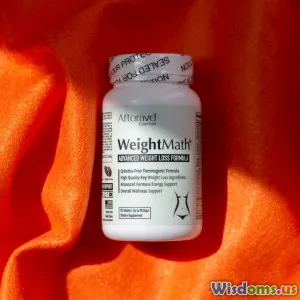
The Truth About Fat Burners in Your Fitness Journey
8 min read Discover the real effects and science behind fat burners in your fitness journey with evidence-based insights. (0 Reviews)
The Truth About Fat Burners in Your Fitness Journey
Fat burners have long been marketed as the secret weapon in the fight against stubborn body fat. From flashy advertisements promising rapid weight loss to countless product claims heralding them as magic pills, it’s easy to be enticed. But what does science say about their real impact? Are fat burners truly effective, or are they just another fitness myth? This article unpacks the truth behind fat burners, helping you understand their role, benefits, limitations, and safety so you can make informed decisions on your fitness path.
What Are Fat Burners?
Fat burners refer to supplements designed to increase the body's ability to burn fat. They come in various forms, including pills, powders, and drinks. Commonly, fat burners claim to:
- Boost metabolism to increase calorie expenditure
- Suppress appetite to reduce calorie intake
- Enhance energy to improve workout performance
Popular Ingredients in Fat Burners
Many fat burners contain one or a combination of the following ingredients:
- Caffeine: A stimulant that increases metabolic rate and alertness.
- Green Tea Extract: Contains catechins believed to promote fat oxidation.
- CLA (Conjugated Linoleic Acid): Thought to influence fat metabolism.
- L-Carnitine: Involved in transporting fatty acids into mitochondria for energy.
- Yohimbine: A compound that may increase fat breakdown by blocking specific receptors.
For example, a 2009 study found that green tea extract with caffeine increased fat oxidation by 17% in participants during moderate exercise. This highlights caffeine and green tea as evidence-backed fat burner ingredients.
Do Fat Burners Really Work? Examining the Evidence
Metabolic Boost: Modest but Real
Many fat burners rely on stimulants like caffeine to mildly increase your metabolic rate. Research indicates caffeine can boost resting metabolic rate by 3-11%. However, this effect is often small and may diminish over time due to tolerance.
Appetite Suppression: Variable Effects
Appetite suppression can reduce calorie intake, aiding fat loss. Ingredients like green tea extract, fiber, or gymnema sylvestre claim to impact hunger, but scientific support varies. For instance, an NIH-funded trial suggested green tea might slightly reduce hunger, but not dramatically enough as a sole appetite suppressant.
Fat Oxidation: Limited by Exercise and Diet
Some components enhance fat utilization as fuel, but effectiveness heavily depends on exercise and dietary context. A landmark review in the International Journal of Sport Nutrition and Exercise Metabolism (2017) concluded that fat burners alone don’t significantly reduce fat mass without consistent exercise.
Real-World Weight Loss Impact
A 2015 meta-analysis analysing multiple fat burner supplements concluded typical weight loss differences after 12 weeks compared to placebo ranged between 1-3 kilograms. While this is positive, it pales in comparison to results achieved through lifestyle changes alone.
Risks and Side Effects: When Fat Burners Go Too Far
Though often perceived as harmless, fat burners carry risks, especially when improperly used.
Potential Side Effects
- Heart palpitations and increased blood pressure: Particularly with stimulants like caffeine and yohimbine.
- Jitters, anxiety, and insomnia: Due to nervous system stimulation.
- Digestive distress: Some ingredients can cause nausea or diarrhea.
- Interactions with medications: Fat burners may interfere with prescription drugs.
In 2010, the FDA issued warnings against certain fat burner supplements containing unapproved ingredients linked to serious cardiovascular events, underscoring safety concerns.
Regulatory Oversight
Dietary supplements, including fat burners, are less strictly regulated than pharmaceuticals. This lack of stringent regulation creates risks of contamination, mislabeling, or inclusion of banned substances.
Incorporating Fat Burners Wisely in Your Fitness Plan
Setting Realistic Expectations
Understand fat burners are supplements—not magic pills. They can assist modestly in fat metabolism or appetite control but should never substitute proper nutrition, exercise, or sleep.
Optimize Foundation First
- Nutrition: Maintain a caloric deficit through a balanced diet rich in whole foods.
- Exercise: Regular resistance and cardiovascular training stimulate fat loss physiologically.
- Sleep and Stress: Both influence hormonal balance and fat storage.
If You Choose to Use Fat Burners
- Research reputable brands with third-party testing.
- Start with low doses to assess tolerance.
- Avoid stacking multiple stimulants.
- Consult your healthcare provider, especially if pre-existing health conditions exist.
Example: Effective Use of Caffeine
Athletes often use caffeine pre-workout to increase alertness and endurance. Scientific consensus supports moderate caffeine intake improves performance and slightly enhances calorie burn without significant risk when consumed responsibly.
Alternative Evidence-Based Strategies for Fat Loss
Instead of relying heavily on fat burners, consider proven strategies:
- High-Intensity Interval Training (HIIT): Burns calories rapidly and improves metabolic rate.
- Volumetrics Eating: Consuming high-volume, low-calorie foods to stay full while reducing calories.
- Adequate Protein Intake: Preserves muscle mass, increasing resting metabolic rate.
For instance, a 2012 study in the Journal of Obesity showed participants who increased protein intake during weight loss retained more lean muscle and lost more fat compared to lower protein groups.
Conclusion: The Balanced Truth About Fat Burners
Fat burners can play a minor role in enhancing fat loss by modestly boosting metabolism or reducing appetite, primarily when ingredients like caffeine or green tea extract are involved. However, they are not miracle solutions. The small benefits they offer are overshadowed by consistent, sustainable lifestyle changes involving diet, exercise, and overall health.
Furthermore, safety concerns and regulatory issues mean they must be used cautiously. Prioritize foundational practices before considering supplementation, and always consult healthcare professionals if unsure.
In the end, your best fat burner might simply be a well-rounded fitness plan combined with patience and persistence — no shortcuts needed.
Empower your fitness journey with knowledge, and let science guide your choices for lasting health and performance.
Rate the Post
User Reviews
Popular Posts

















